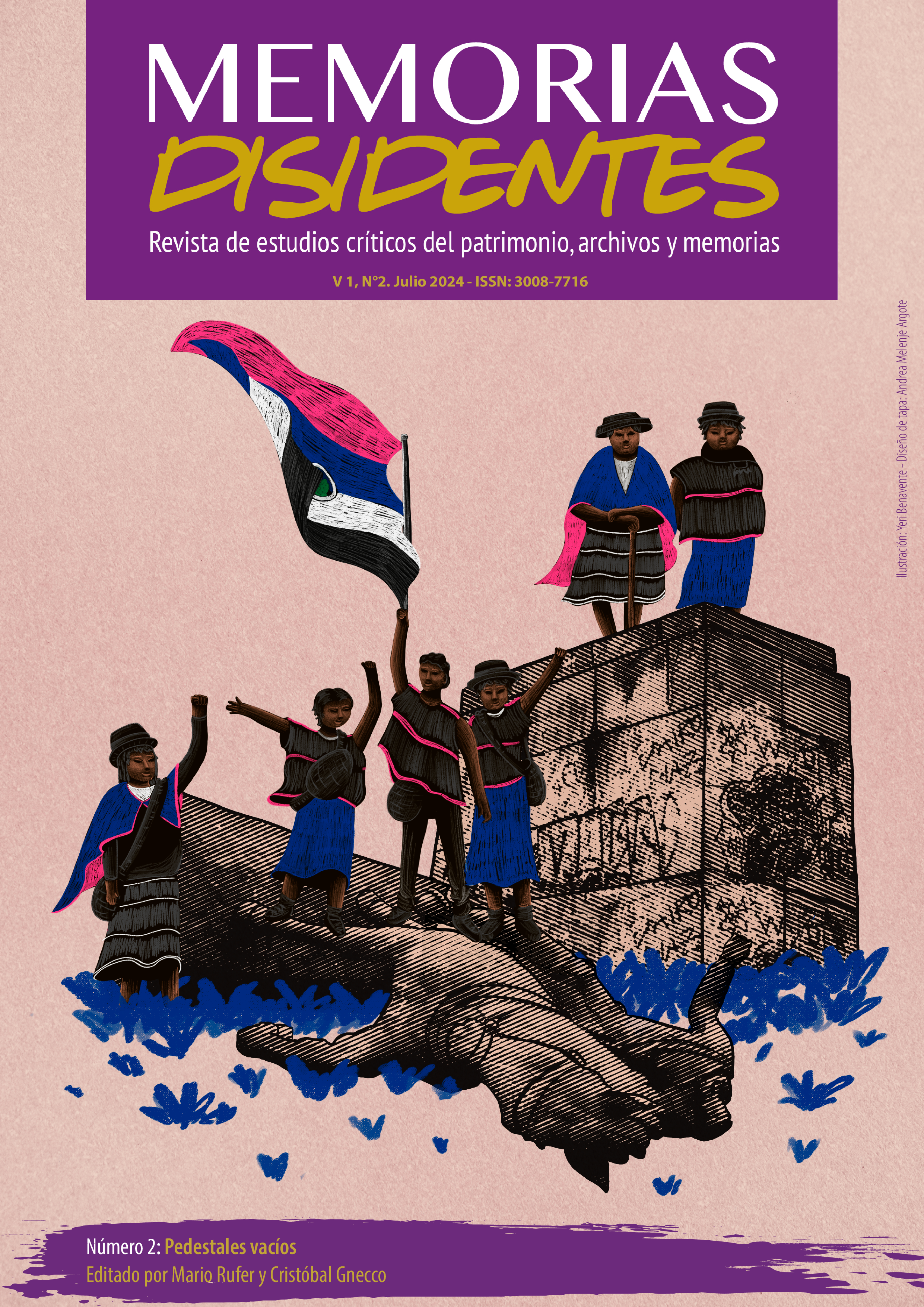Between antimonuments and winged victories: memory practices of a feminist political language
Main Article Content
Abstract
Article Details

This work is licensed under a Creative Commons Attribution-NonCommercial-ShareAlike 4.0 International License.

-
The authors retain the rights of autxr and assign to the journal the right to first publication of the work, registered under the Creative Commons attribution license, which allows third parties to use what is published as long as they mention the authorship of the work and the first publication in this journal.
-
Authors may make other independent and additional contractual agreements for the non-exclusive distribution of the version of the article published in this journal (for example, including it in an institutional repository) as long as they clearly indicate that the work was first published in this journal.
-
The authors grant any third party the right to share and use the article (for non-commercial purposes), provided that the original authors and the citation of the version published in this journal are identified.
References
Belausteguigoitia, Marisa y Saldaña-Portillo, María Josefina (2015). Des /posesión: género, territorio y luchas por la autodeterminación. UNAM.
Belausteguigoitia Marisa, Borzacchiello, Emanuela, Lozano, Rian (2022) Strikes, stoppages, occupations: Mexican feminist writing on the walls. Critical Times 5 (2), 444-474.
Berlanga, Mariana (2018). Una mirada al feminicidio. UACM
Borzacchiello, Emanuela (2024) ¡rExistimos! El feminicidio y la telaraña de poderes. CIEGHUNAM- Bajo Tierra.
Cabnal, Lorena (2010). Feminismos diversos: el feminismo comunitario. ACSUR-Las Segovias, Asociación para la Cooperación con el Sur.
Espinosa, Gisela y Lau, Ana (2013) Un fantasma recorre el siglo: luchas feministas en México, 1910-2010. UNAM.
Estudillo, Joel y Nieto, José Edgar coord. (2016). Feministas mexicanas del siglo XX, espacios y
ámbitos de incidencia. CIEGH-UNAM
Federici, Silvia (2022). Ir más allá de la piel repensar, rehacer y reivindicar el cuerpo en el capitalismo contemporáneo. Traficantes de Sueños.
Federici, Silvia (2020). Reencantar el mundo el feminismo y la política de los comunes. Traficantes de Sueños.
Gago, Verónica (2020). La potencia feminista. O el deseo de cambiarlo todo. Bajo Tierra.
Gago, Verónica y Borzacchiello, Emanuela (2023). Gestos y territorios simbólicos: resonancias entre Argentina y México. En: Ana María González, Lucía Raphael y Lucía Melgar (Eds.), Pensar la justicia con perspectiva de género (pp. 105-132). UNAM.
Gargallo, Francesca (2014). Feminismos desde Abya Yala ideas y proposiciones de las mujeres de 607 pueblos en nuestra América. Corte y Confección.
Grupo de Trabajo para Asuntos Latinoamericanos del Centro para las Políticas Internacionales y la Oficina en Washington para Asuntos Latinoamericanos (2011). Un Relato Aleccionador: Las Lecciones del Plan Colombia para la Política Exterior Estadounidense hacia México y Otros Países. Disponible en: chrome-extension://efaidnbmnnnibpcajpcglclefindmkaj/https://www.lawg.org/wp-content/uploads/Un-Relato-Aleccionador-2011.pdf
hooks, bell (2015). Talking back. Thinking feminist, thinking black. Routledge.
Jiménez-Esquinas, Guadalupe (2017). El patrimonio (también) es nuestro: Hacia una crítica patrimonial feminista. En Iñaki Arrieta (ed.), El género en el patrimonio cultural, (pp. 19-48). Universidad del País Vasco.
Lamas, Marta (2015). El largo camino hacia la ILE. Mi versión de los hechos. CIRGH- UNAM.
Lonzi, Carla (1977). Sputiamo su Hegel. La donna clitoridea e la donna vaginale. E altri scritti. Rivolta Femminile.
López, Helena y Arreola, Adriana (Eds) (2017). Condiciones de la globalización políticas neoliberales y dinámicas de género. CIEGH-UNAM.
Millán, Márgara (2021). Derivas de un cine en femenino. Bajo Tierra.
Monárrez, Julia (2009). Trama de una injusticia: Feminicidio sexual sistémico en Ciudad Juárez. El Colegio de la Frontera Norte/Miguel Ángel Porrúa.
Olivera, Mercedes (1976), Consideraciones sobre la opresión femenina como una categoría para el análisis socio-económico. Anales de Antropología13 (1), 199-215.
Olivera, Mercedes, Bermúdez, Flor Marina y Arellano, Mauricio (2014). Subordinaciones estructurales de género: las mujeres marginales de Chiapas frente a la crisis. Centro de Derechos de la Mujer de Chiapas, Centro de Estudios Superiores de México y Centroamérica.
Ramírez, Ivonne (29 de agosto 2015). Ladyfest Juárez 2015, la desobediencia nos hará libres.
Revista Digital LaqueArde. https://www.laquearde.org/2015/08/29/ladyfest-juarez-2015-ladesobediencia-
nos-hara-libres-por-ivonne-ramirez/
Segato, Rita Laura (2006). La escritura en el cuerpo de las mujeres asesinadas en Ciudad Juárez. Territorio, soberanía y crímenes de segundo estado. Universidad del Claustro de Sor Juana.
Smith, Laurajane (2008). Heritage, gender and identity. En Brian Graham y Peter Howard (Eds), Ashgate Research Companion to Heritage and Identity, (pp. 159-178). Ashgate.
Urrutia, Elena (1979). Una maquiladora en la zona fronteriza, en la revista Uno Más Uno. Archivo personal de Marta Lamas.
Yanagi, Soetsu (2020). La belleza del objeto cotidiano. Gustavo Gili.
Sitios web, diarios y otros archivos consultados
Danielle De Luca, Cultural Survival (5 de noviembre 2013). Declaración de Lima de la Confe-rencia Global de Mujeres Indígenas, octubre 2013. Forest Peoples Programme.https://www.forestpeoples.org/es/topics/las-cuestiones-de-genero/news/2013/11/declaracion-de-lima-de-la-conferencia-global-de-mujeres
La liga tensa (7 de julio 2022). Los cuadernos de La Liga tensa. https://ligatensa.wordpress.com/2022/07/12/499/

